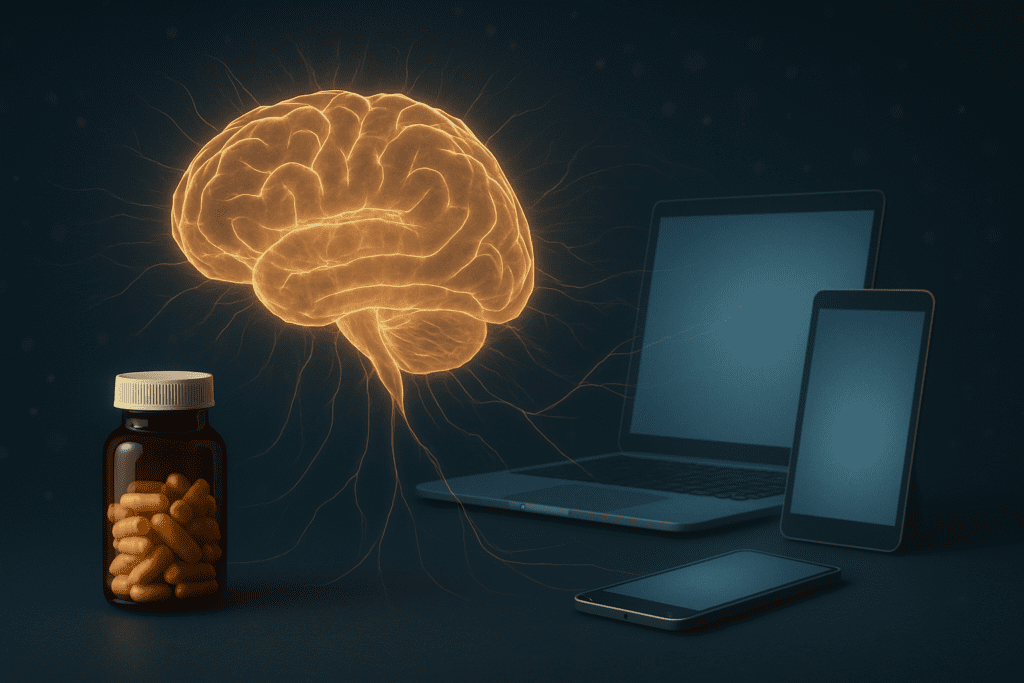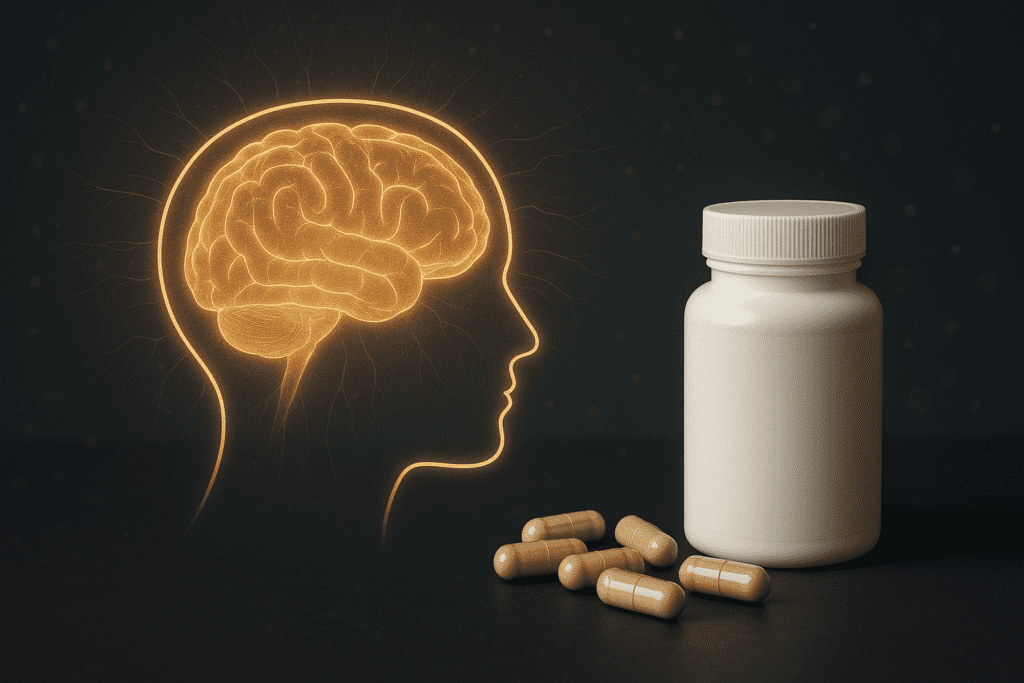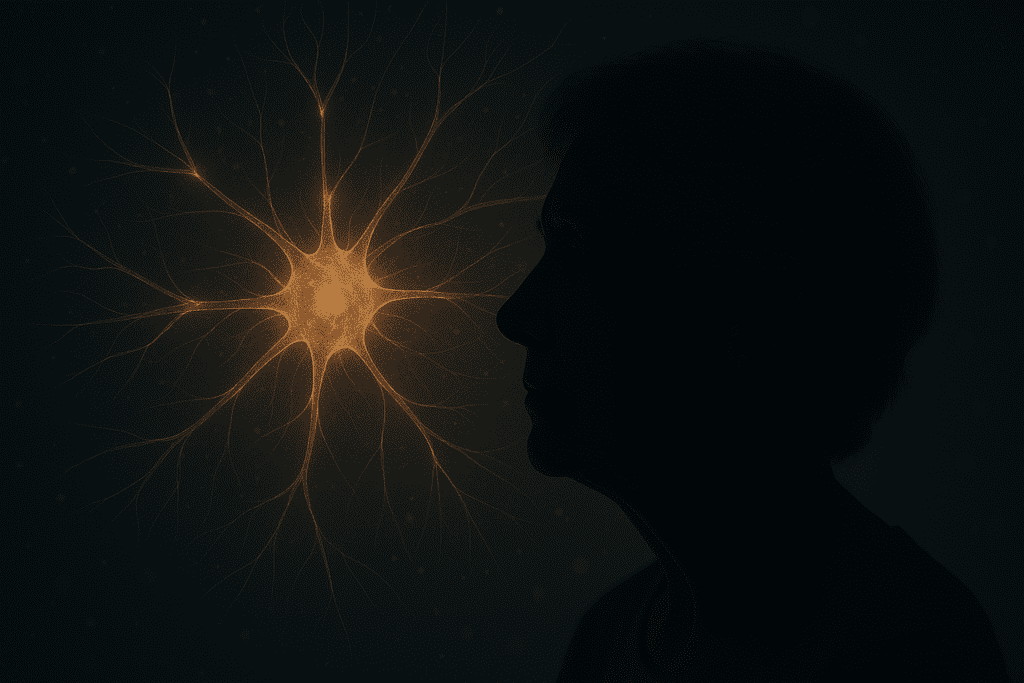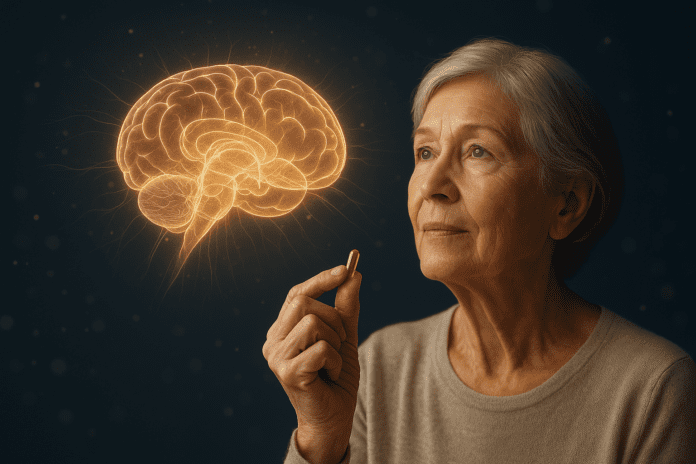Introduction: The Growing Demand for Cognitive Longevity in an Aging World
In an age where the average human lifespan continues to extend thanks to scientific progress, there is a rising awareness that simply living longer isn’t enough. The quality of those extra years—particularly in terms of cognitive health—is increasingly becoming a central concern. Across the globe, millions are asking how they can stay mentally sharp and emotionally resilient into their 60s, 70s, and beyond. As a result, the supplement industry has exploded with formulations promising everything from enhanced memory to laser-sharp focus. One name that has repeatedly emerged in this conversation is the Ageless Brain supplement. Promising to support memory, mental clarity, and focus well into older adulthood, Ageless Brain has become the subject of both widespread interest and skeptical inquiry.
You may also like: How to Prevent Dementia and Alzheimer’s Disease Naturally: Expert-Backed Strategies to Reduce Your Risk Through Lifestyle and Diet
Understanding Cognitive Decline: The Battle Against Time and Biology
Cognitive decline is not a sudden phenomenon but rather a gradual process influenced by genetics, environmental exposure, oxidative stress, chronic inflammation, hormonal shifts, and nutrient deficiencies. Even in healthy individuals, the brain’s processing speed tends to slow with age. Memory lapses become more common, attention spans may shorten, and multitasking becomes increasingly difficult.
This natural trajectory doesn’t necessarily signal pathology. However, in some individuals, the decline is more precipitous and may point to neurodegenerative diseases like Alzheimer’s or other forms of dementia. Regardless of whether it’s part of normal aging or a more serious condition, the fear of losing one’s mental faculties can be deeply unsettling. That fear has spurred interest in lifestyle changes, cognitive training, and most notably, nutritional supplements like Ageless Brain that promise a protective or enhancing effect.
According to experts in gerontology and clinical neuroscience, brain health in aging populations is highly modifiable. While genetics play a role, they do not dictate destiny. Factors such as diet, exercise, sleep, and mental stimulation can all dramatically alter the trajectory of cognitive aging. This has opened the door for interventions that provide targeted nutritional support, offering the possibility of extending not just lifespan but “health span”—a life lived with full cognitive engagement.
What Is Ageless Brain? Exploring the Formulation
The Ageless Brain supplement is positioned as a natural nootropic—a brain-boosting compound that supports mental clarity, memory retention, focus, and mood regulation. Developed by Pure Health Research, Ageless Brain combines a blend of vitamins, minerals, plant-based antioxidants, and herbal extracts, each purported to support different facets of cognitive function.
Key ingredients often include compounds like Cat’s Claw, Huperzine A, Bacopa monnieri, Phosphatidylserine, Ginkgo biloba, and L-theanine, among others. These are not random inclusions. Each of these has a pharmacological rationale and is supported by various degrees of clinical evidence. The formulation reflects a growing understanding of how inflammation, neurotransmitter imbalances, oxidative stress, and even gut health can influence the brain.
For instance, Bacopa monnieri has been used in Ayurvedic medicine for centuries to support memory and concentration. Huperzine A, a compound extracted from Chinese club moss, is a natural acetylcholinesterase inhibitor—meaning it prevents the breakdown of acetylcholine, a neurotransmitter essential for learning and memory. Ginkgo biloba, well-known for its circulation-enhancing effects, has been shown in some studies to improve cognitive function, particularly in individuals with age-related cognitive decline.
When assessing products like Ageless Brain, one must consider not just the individual ingredients but how they interact synergistically. It’s one thing to show that a compound has an effect in isolation, but real-world efficacy depends on bioavailability, dosage, and formulation stability. This is where Ageless Brain reviews become important, offering insight into how the product performs outside of a controlled laboratory setting.
Expert Perspectives on Cognitive Enhancement Through Supplementation
Experts in cognitive neuroscience and integrative medicine have weighed in on the increasing popularity of brain supplements. Dr. Lisa Mosconi, a neuroscientist at Weill Cornell Medical College and director of the Women’s Brain Initiative, emphasizes that while no supplement can replace the benefits of a brain-healthy lifestyle, certain compounds can serve as adjunctive tools to support long-term cognitive resilience.
Neuropharmacology’s Dr. Andrew Huberman, from Stanford University, has also discussed the role of nootropics in podcast interviews, noting that while synthetic cognitive enhancers can carry risks, natural supplements with a solid evidence base—like those found in Ageless Brain—may offer a safe path toward enhanced mental performance.
From a clinical point of view, geriatric psychiatrist Dr. Gary Small—known for his work on memory and Alzheimer’s prevention—advocates for early, proactive approaches to cognitive health. He points out that ingredients like Huperzine A and Ginkgo biloba are particularly promising because of their neuroprotective and anti-inflammatory properties. Such compounds may help reduce brain atrophy and support the formation of new synaptic connections in older adults.
Dietitians and integrative health coaches also weigh in on the importance of nutrient synergy. According to registered dietitian Dr. Elizabeth Boham, nutrients like phosphatidylserine and L-theanine work best when paired with a diet rich in omega-3s and polyphenols. She stresses that while supplements like Ageless Brain are not magic pills, they can help bridge the gap between nutritional needs and cognitive performance goals, especially in aging populations.
Examining Real-World Ageless Brain Reviews: What Users Are Saying
Consumer reviews can offer valuable insights into a supplement’s effectiveness, particularly when analyzed through the lens of consistency, dosage adherence, and individual baseline health. A growing body of Ageless Brain reviews across health forums, supplement aggregators, and third-party platforms reveals patterns that merit attention.
Many users report enhanced clarity of thought, improved memory recall, and a reduction in mental fatigue within weeks of consistent use. Several reviewers in their 50s and 60s described feeling more mentally “awake” or less prone to brain fog during daily tasks. A number of individuals noted that they were able to concentrate for longer periods, especially in cognitively demanding environments like work or caregiving.
Interestingly, positive feedback is not confined to older demographics. Younger users—particularly professionals seeking to maintain peak performance—have also reported subjective improvements in focus and mood regulation. They describe the supplement as a “subtle but effective” enhancement, with no noticeable crash or jitteriness, unlike synthetic stimulants.
On the critical side, a few users noted minimal effects or cited delayed onset of benefits, which is not surprising given the nature of herbal and nutritional supplementation. Unlike pharmaceutical drugs, which often act quickly, natural compounds typically require weeks of consistent use before their full effects manifest.
Another recurring theme in Ageless Brain reviews is the importance of pairing the supplement with healthy lifestyle habits. Those who combined it with regular exercise, quality sleep, and a brain-supportive diet were more likely to report positive results. This reinforces the idea that while supplements can be powerful tools, they work best as part of a comprehensive cognitive health strategy.

Cognitive Benefits Beyond Memory: Focus, Mood, and Mental Energy
While much of the attention around nootropic supplements revolves around memory enhancement, Ageless Brain also claims to support mental clarity, focus, and emotional regulation. This holistic cognitive profile is increasingly important, as the experience of aging is not limited to memory decline alone. Many older adults report decreased concentration, lower motivation, mood swings, and even mild depression—all of which can diminish quality of life.
L-theanine, one of the key ingredients, is known to modulate levels of dopamine, serotonin, and GABA—neurotransmitters involved in mood balance, relaxation, and motivation. Unlike sedatives, L-theanine induces a state of relaxed alertness, often described as “calm focus.” This makes it particularly valuable for individuals struggling with mental fatigue or anxiety-induced cognitive fog.
Ginkgo biloba improves cerebral circulation, ensuring that neurons receive adequate oxygen and glucose. This is critical because even minor disruptions in blood flow can impair focus and executive function. Several clinical trials have demonstrated that Ginkgo enhances attention span and processing speed, particularly in older adults with mild cognitive impairment.
Stress, too, plays a major role in cognitive aging. Chronic activation of the hypothalamic-pituitary-adrenal (HPA) axis can result in elevated cortisol levels, which over time damage hippocampal neurons and impair learning and memory. Compounds in Ageless Brain, such as phosphatidylserine and Bacopa, may help regulate cortisol output and increase resilience to stress—indirectly preserving cognitive function.
As a result, users of Ageless Brain frequently report not only sharper memory but also more sustained focus, improved mood, and greater motivation. These outcomes are corroborated by many detailed Ageless Brain reviews, in which users often express surprise at the emotional and energetic benefits, in addition to the expected cognitive ones.
Who Might Benefit Most from Ageless Brain?
One of the most pressing questions for prospective users is whether Ageless Brain is right for them. While it’s marketed broadly to anyone concerned about cognitive health, certain populations may stand to benefit more significantly from its targeted formulation.
Adults in their 40s and 50s experiencing the first signs of mental fatigue or mild forgetfulness may find Ageless Brain particularly helpful as a preventive tool. This age group is increasingly interested in proactive strategies to maintain productivity and mental sharpness, especially in high-demand professions.
Older adults with mild cognitive impairment (MCI) represent another population that may benefit. Although MCI does not always progress to dementia, it can still interfere with daily functioning. Supplements like Ageless Brain offer a non-pharmaceutical option for addressing these issues, particularly for those seeking a more natural intervention.
Caregivers of aging parents or loved ones may also find value in exploring Ageless Brain as part of a larger supportive regimen. While it should never replace medical treatment, it may serve as a complementary strategy when used under the guidance of a healthcare provider.
Even younger adults, such as college students and professionals, have expressed interest in natural cognitive enhancers. However, experts caution that supplements like Ageless Brain are not a substitute for sleep, exercise, or stress management. For this demographic, the supplement may offer a mild boost in focus or stress resilience but should not be relied upon as the primary tool for mental performance.
Across demographics, the most consistent message is that results are best when the supplement is integrated into a lifestyle that includes proper nutrition, mental stimulation, physical activity, and quality sleep—factors that enhance the effectiveness of any nootropic intervention.
Potential Limitations and Precautions: A Balanced Perspective
Despite its promise, it’s important to approach any supplement with a critical mindset. Ageless Brain, while generally well-tolerated, may not be appropriate for everyone. Like all supplements, its safety depends on dosage, individual health status, and possible interactions with other medications.
For example, Huperzine A, while effective, is a potent compound that can cause side effects in sensitive individuals, including nausea or sleep disturbances. Its action on acetylcholine levels means it could potentially interact with medications for Alzheimer’s disease or myasthenia gravis. Similarly, Ginkgo biloba has anticoagulant properties and may not be advisable for individuals on blood thinners.
Consumers with underlying health conditions—especially neurological or cardiovascular—should consult with a healthcare provider before starting Ageless Brain. Pregnant or breastfeeding individuals, and those under 18, are generally advised against taking nootropic supplements unless specifically recommended by a physician.
There is also the broader issue of regulatory oversight. As a dietary supplement, Ageless Brain is not subject to the same rigorous testing as pharmaceutical drugs. While this does not inherently mean it is unsafe, it underscores the importance of choosing products from reputable companies that follow Good Manufacturing Practices (GMP) and provide transparent ingredient sourcing.
Despite these concerns, the safety profile of Ageless Brain appears favorable, particularly when used as directed. Still, users should remain attentive to their own responses and consult a healthcare provider if they notice any adverse effects. The overall consensus from Ageless Brain reviews is that side effects are rare and generally mild, but individual experiences may vary.
Integrating Ageless Brain Into a Holistic Brain Health Strategy
Supplements like Ageless Brain are best understood not as magic bullets but as components of a comprehensive cognitive wellness plan. Research in neuroplasticity has shown that the brain is highly adaptable, even into later life. However, this adaptability depends on a consistent influx of nutrients, physical activity, mental challenges, and emotional balance.
Pairing Ageless Brain with a Mediterranean-style diet, rich in leafy greens, berries, fish, olive oil, and nuts, can amplify its benefits. These foods are known to reduce inflammation and oxidative stress, two key drivers of cognitive decline. Regular exercise, particularly aerobic and resistance training, enhances cerebral blood flow and supports neurogenesis.
Mindfulness practices such as meditation and yoga have also been shown to increase gray matter density and reduce cortisol levels. Cognitive training programs, social engagement, and even hobbies like learning a new language or musical instrument can help create new neural pathways and preserve mental agility.
Ageless Brain may offer the additional boost needed to optimize these efforts. By enhancing neurotransmitter availability, reducing inflammation, and supporting neuronal membrane integrity, it helps create the ideal internal environment for neuroplasticity to thrive.
For those seeking to maintain independence and cognitive sharpness throughout life, this integrative approach—combining lifestyle, nutrition, and targeted supplementation—offers the most scientifically grounded path forward.

Frequently Asked Questions (FAQ): Ageless Brain and Cognitive Longevity
1. Can Ageless Brain support cognitive performance in high-stress professional environments?
Yes, Ageless Brain may offer subtle yet meaningful support for individuals operating in high-pressure roles. While it was designed with aging adults in mind, some of the ingredients—like L-theanine and Bacopa monnieri—may benefit professionals experiencing mental fatigue, multitasking overload, or attention fragmentation due to stress. These compounds have adaptogenic properties that help regulate cortisol levels, potentially improving focus during long hours of cognitively demanding work. Several Ageless Brain reviews from younger users note enhanced concentration and reduced burnout, especially when the supplement is taken consistently with adequate hydration and sleep. However, it’s not a substitute for lifestyle balance—it works best as a cognitive buffer within a broader mental wellness routine.
2. How does Ageless Brain differ from synthetic nootropics and pharmaceutical cognitive enhancers?
Unlike synthetic nootropics such as modafinil or prescription stimulants, Ageless Brain uses plant-derived compounds and bioavailable nutrients that support brain health over time, rather than providing an artificial mental boost. Synthetic options often act as short-term performance enhancers and can come with risks of dependency, jitteriness, or rebound fatigue. Ageless Brain, by contrast, aims to optimize the brain’s internal environment by reducing inflammation, supporting neurotransmitter balance, and enhancing neuroplasticity. Many users report improvements that unfold gradually, aligning with what is seen in long-term neuro-supportive regimens. According to recent Ageless Brain reviews, users tend to favor its gentle profile and the fact that it doesn’t produce abrupt highs or crashes.
3. What should users know about stacking Ageless Brain with other supplements or nutraceuticals?
Stacking, or combining multiple supplements for synergistic benefit, is a popular approach in the nootropics community. However, caution is necessary when integrating Ageless Brain with other cognitive enhancers. For example, combining Huperzine A (found in Ageless Brain) with other acetylcholine-boosting agents may increase the risk of cholinergic side effects, such as headaches or insomnia. Similarly, stacking it with additional Ginkgo biloba or adaptogens may amplify circulatory or hormonal effects. That said, some users report positive outcomes when pairing Ageless Brain with omega-3 fatty acids or vitamin D, both of which support neuronal integrity. Reviewing Ageless Brain reviews from experienced users can offer insight into safe and effective stacking practices, but it’s always best to consult with a healthcare provider before mixing supplements.
4. Are there any psychological or emotional benefits reported from taking Ageless Brain?
Interestingly, a growing number of users have reported mood enhancements as a secondary benefit of Ageless Brain. Ingredients like L-theanine and Bacopa not only support cognitive function but may also influence serotonin and GABA pathways, which are involved in regulating mood and stress response. Some Ageless Brain reviews highlight reduced irritability, calmer emotional reactivity, and even improved resilience during high-pressure situations. These effects are subtle and usually accumulate with continued use. While Ageless Brain is not a treatment for mood disorders, it may offer mood-supportive benefits that contribute to an improved sense of mental well-being, especially when used as part of a lifestyle that includes mindfulness and emotional regulation practices.
5. What role does Ageless Brain play in sleep quality and circadian rhythm stability?
Although not explicitly formulated as a sleep supplement, some ingredients in Ageless Brain indirectly support better sleep. For example, L-theanine can promote alpha brain waves, associated with calm wakefulness, which may help users transition more smoothly into restful sleep. Chronic stress and elevated cortisol—known disruptors of circadian rhythms—may also be mitigated by ingredients like phosphatidylserine. A number of Ageless Brain reviews mention that users experienced improved sleep continuity or deeper rest after several weeks of use, even if that wasn’t their primary goal. Nevertheless, results vary, and users with persistent sleep disorders should not rely on cognitive supplements alone; addressing sleep hygiene directly remains essential.
6. How might Ageless Brain influence long-term neuroplasticity or brain resilience?
Emerging research in the field of neuroplasticity—the brain’s ability to reorganize and form new connections—suggests that certain nutrients and herbal compounds can support this capacity. Ingredients like Bacopa monnieri and Cat’s Claw have been shown in animal studies to promote dendritic growth and synaptic density. Over time, this may translate to better learning, adaptability, and resistance to age-related cognitive decline. Some Ageless Brain reviews reflect improvements in learning new skills or recovering mental agility after periods of cognitive fatigue, which could be a sign of improved neuroplastic potential. While more longitudinal research is needed, Ageless Brain’s formulation aligns with the current science around maintaining cognitive flexibility and resilience into later life.
7. Is there a specific time of day that optimizes the effects of Ageless Brain?
Timing can influence how individuals respond to Ageless Brain. Because it supports alertness and mental clarity, many users prefer taking it in the morning or early afternoon to align with peak cognitive activity. Taking it too late in the day—particularly for sensitive individuals—might interfere with evening wind-down routines due to the stimulating effects of certain ingredients like Huperzine A or Ginkgo biloba. Interestingly, some Ageless Brain reviews recommend taking the supplement after a protein-rich breakfast to aid in nutrient absorption and reduce the risk of gastrointestinal discomfort. As with many supplements, personal experimentation within safe limits can help identify the optimal timing based on individual response and daily rhythm.
8. What do experts recommend when evaluating the credibility of Ageless Brain reviews online?
Given the overwhelming volume of health-related content online, it’s essential to approach Ageless Brain reviews with discernment. Experts suggest prioritizing reviews that include specific context—such as age, lifestyle, health status, and duration of use—over vague endorsements. Watch for reviews that mention both pros and cons, as they tend to reflect a more balanced experience. Additionally, cross-referencing user feedback on independent forums or third-party platforms can help filter out potential marketing bias. Healthcare professionals also advise comparing user experiences with published evidence on individual ingredients, which adds another layer of verification. Ultimately, Ageless Brain reviews are most informative when viewed as experiential data points that complement, not replace, scientific evidence.
9. Are there any overlooked lifestyle factors that enhance the effectiveness of Ageless Brain?
While diet, exercise, and sleep are commonly emphasized, several lesser-discussed lifestyle factors can further enhance Ageless Brain’s impact. One is light exposure—especially morning sunlight—which helps regulate circadian rhythm and optimize hormone cycles that influence brain function. Another is environmental enrichment, including regular novelty, social interaction, and creative activities that stimulate cognitive growth. Some users in detailed Ageless Brain reviews reported faster results when they paired the supplement with brain-training apps or activities like learning new instruments. Staying hydrated and minimizing exposure to neurotoxins (such as heavy metals or excessive alcohol) can also potentiate results. These integrative practices create a neuro-supportive foundation that allows supplements like Ageless Brain to work more effectively.
10. How might future research and innovation shape the next generation of cognitive supplements like Ageless Brain?
The future of cognitive supplementation is moving toward precision nootropics—formulas tailored to individual genetic, metabolic, and cognitive profiles. Advances in epigenetics and microbiome research may soon allow companies to design personalized versions of Ageless Brain that account for how individuals metabolize compounds like Huperzine A or Bacopa. There’s also growing interest in delivery mechanisms, such as liposomal encapsulation or nanotechnology, which could improve the bioavailability of existing ingredients. As AI-driven health platforms evolve, they may integrate real-time cognitive tracking with supplement dosing recommendations, creating a feedback loop for optimized brain health. These developments could eventually enhance or expand the current capabilities of Ageless Brain. While existing Ageless Brain reviews provide valuable real-world data, future versions of the product may be more personalized and adaptive than ever before.

Conclusion: Is Ageless Brain a Viable Tool for Long-Term Mental Clarity and Focus?
In an increasingly cognitively demanding world, where both professional success and quality of life hinge on mental acuity, the appeal of supplements like Ageless Brain is undeniable. Backed by a formulation that integrates traditional botanicals with modern neuroscience, Ageless Brain offers a multifaceted approach to supporting cognitive health. The positive trends reflected in numerous Ageless Brain reviews align with expert assessments and the existing body of clinical evidence on its core ingredients.
While no supplement can singlehandedly prevent cognitive decline or replace the foundational elements of a healthy lifestyle, Ageless Brain appears to provide meaningful support when used appropriately. Its combination of neuroprotective, anti-inflammatory, and neurotransmitter-modulating compounds may help users maintain mental clarity, enhance focus, and improve memory—particularly in aging populations.
The supplement’s effectiveness will naturally vary from person to person, influenced by baseline health, lifestyle habits, and expectations. Still, the available data suggest that for many users, Ageless Brain is more than just a trend—it represents a thoughtful, scientifically informed approach to cognitive longevity.
For those who value proactive health strategies and are seeking to preserve their brain’s vitality, Ageless Brain may serve as a powerful ally. By integrating this supplement into a broader wellness plan grounded in evidence-based practices, individuals can take a meaningful step toward aging not just gracefully, but brilliantly—mind first.
brain supplements for memory, natural nootropics for focus, cognitive health support, memory improvement vitamins, herbs for brain fog, supplements for mental clarity, aging and brain function, neuroprotective herbs, natural brain boosters, how to improve concentration naturally, best supplements for brain performance, mood enhancing supplements, focus and memory support, brain aging prevention, neuroplasticity support, mind sharpening herbs, adaptogens for brain health, holistic cognitive wellness, natural remedies for forgetfulness, vitamins for brain energy
Further Reading:
Brain Supplements That Do and Don’t Work
Do Brain Supplements Actually Work?
Disclaimer
The information contained in this article is provided for general informational purposes only and is not intended to serve as medical, legal, or professional advice. While Health11News strives to present accurate, up-to-date, and reliable content, no warranty or guarantee, expressed or implied, is made regarding the completeness, accuracy, or adequacy of the information provided. Readers are strongly advised to seek the guidance of a qualified healthcare provider or other relevant professionals before acting on any information contained in this article. Health11News, its authors, editors, and contributors expressly disclaim any liability for any damages, losses, or consequences arising directly or indirectly from the use, interpretation, or reliance on any information presented herein. The views and opinions expressed in this article are those of the author(s) and do not necessarily reflect the official policies or positions of Health11News.


